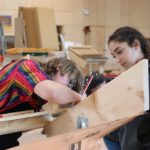Research shows that Canadian adults who want to take advantage of training opportunities often cite a lack of time due to work scheduling and personal/family commitments, the cost of training, or the sacrifice of needed income as barriers. Many of these prospective learners are looking for short-duration, flexible training, offered outside of regular business hours, that allows them to continue working so they can maintain their current lifestyles. In other words, they need to earn while they learn.
The traditional post-secondary model, with full-time classes, set class times, and on-campus delivery, is a successful model for many, but may not work for everyone. To reach more potential learners, post-secondary institutions have to add more options in self-paced learning, short-term credentials, and alternative delivery models to complement the traditional model.
The good news is, we know increasing education levels helps individuals, communities, and our province. For example, college education reduces the unemployment rate in mature graduates (ages 25-44) in New Brunswick from 13 per cent (those with a high school education) to seven per cent, and increases workforce participation rates from 82 per cent (those with no post-secondary education) to 91 per cent. Beyond decreased unemployment and increased labour force participation rates, college-educated New Brunswickers earn, on average, 35 per cent more compared to those with a high school diploma.
That earning premium directly relates to increased GDP, tax revenue, and household spending in our communities and our province. In fact, estimates from the World Economic Forum found that significant investments in upskilling and retraining could boost GDP in Canada by an estimated 2.4 to 2.7 per cent. If New Brunswick were to fall within this range, it would be equivalent to a provincial boost of between $737 million and $829 million in economic output for the province.
In an increasingly knowledge-intensive economy, if we fail to reach more people with accessible education, retraining, and upskilling opportunities, we run the risk of massive disruptions to our workforce as jobs requiring new skills go unfilled, workers have difficulties transitioning to new jobs, and growth and productivity falter. We cannot wait for the next wave of disruption to address our issues, close our gaps, and serve more people.
As a post-secondary institution, NBCC will continue to work towards serving learners who need or want quick, quality-assured and transferrable training, including learners who can’t leave full-time employment to gain new skills. We will also work to promote innovative approaches with partners to provide spaces for learning-integrated work, increasing connectivity on and off campus, and greater creativity in our training environments.
If we place individuals and their wellbeing at the heart of recovery, our businesses, our communities and our province will also thrive. Providing new and innovative access points is key to ensuring that no one is left behind.





